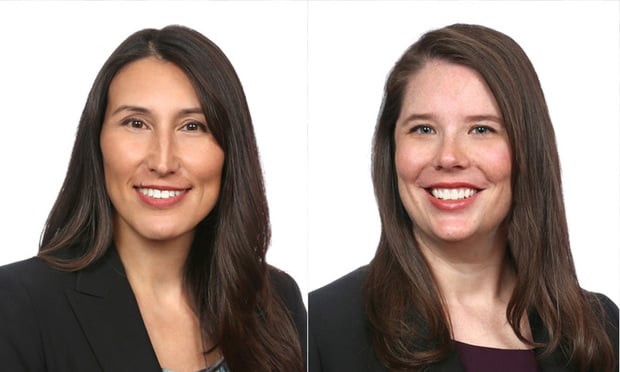When Defending Your Client in a Deposition, Watch Out for Gray Ethical Areas
Prepare witnesses, properly and know the local rules on conferring with your client.
May 24, 2019 at 10:51 AM
6 minute read
The original version of this story was published on Daily Report
 Shari Klevens (left) and Alanna Clair, Dentons. (Courtesy photo)
Shari Klevens (left) and Alanna Clair, Dentons. (Courtesy photo)
Legal industry publications often report on instances in which aggressive attorneys are sanctioned or penalized for crossing the line when taking a deposition. Attorneys are advised against bullying witnesses, attacking opposing counsel or conducting a deposition in a way that violates the ethical rules. However, there also are rules that govern the attorney who is defending the witness at a deposition—obligations that often arise before the deposition even begins.
Indeed, appropriate deposition conduct typically involves more than just refraining from engaging in contentious conduct with opposing counsel. Below are some tips and guidance for attorneys regarding interactions with their own witnesses before and during depositions.
Preparing Witnesses to Testify
Whether a deposition ultimately involves heated arguments between counsel or a frustrated witness who lashes out (harming that party's claims or defenses) can be a direct result of the scope and depth of the defending attorney's preparation of that witness.
Preparing any witness for deposition is an important part of an attorney's role as a zealous advocate, but knowing the boundaries of acceptable preparation is equally important. Most attorneys facing this issue are wary of their ethical obligations when preparing a witness for deposition. Questionable or even sanctionable conduct can arise long before the witness takes the oath and testifies.
Indeed, predeposition meetings, while beneficial and often necessary regardless of whether the witness is testifying as a corporate representative or an individual, also can create risk. It can be tempting for attorneys to improperly “coach” a witness. Further, assisting a witness in fabricating responses to anticipated questions or implicitly suggesting that the witness withhold or alter the truth likely runs afoul of the attorney's duty of candor.
Rule 3.3 of the Model Rules of Professional Conduct states that a “lawyer shall not knowingly … offer evidence that the lawyer knows to be false. If a lawyer … has offered material evidence and the lawyer comes to know of its falsity, the lawyer shall take reasonable remedial measures.” Comment [1] to the rule states that Rule 3.3 applies whenever the lawyer is representing a client in an ancillary proceeding, such as a deposition. Thus, a lawyer is required “to take reasonable remedial measures if the lawyer comes to know that a client who is testifying in a deposition has offered evidence that is false.”
If a client testifies falsely (and the attorney knows that the testimony is false), comment [10] to the rule describes the “reasonable remedial measures” that the attorney must take. The lawyer must first “remonstrate with the client confidentially, advise the client of the lawyer's duty of candor to the tribunal and seek the client's cooperation with respect to the withdrawal or correction of the false statements or evidence. If that fails, the advocate must take further remedial action,” including withdrawal or disclosure to the tribunal as necessary (even if that requires disclosing confidential information).
Learn the Rules
Before attending a deposition, it is also helpful to review the relevant rules governing deposition scope, nature of objections and related motions. Without the presence of a judge in the room, attorneys are expected to self-regulate and conduct the deposition as they would at trial under the rules of evidence. Identifying and understanding the relevant rules is essential to ensuring compliant deposition conduct.
Many courts have local rules that govern discovery; some even have specific guidelines or instructions relating to depositions. Moreover, Rules 30 and 32 of the Federal Rules of Civil Procedure set forth the type and nature of permissible objections, provide the basis for motions to terminate or limit a deposition and address waiver of certain objections.
Conferring During Depositions
One gray area for the deposition that often varies by jurisdiction is whether the defending attorney may confer with the deponent during the deposition. Some courts follow Hall v. Clifton Precision, 150 F.R.D. 525 (E.D. Pa. 1993), which draws a bright line, “no conference” rule. The Hall court reasoned in part that “private conferences … tend, at the very least, to give the appearance of obstructing the truth.”
On the other hand, most jurisdictions follow a less strict approach, prohibiting conferences only when a question is pending. That is because permitting conference while a question is pending could result in an attorney coaching a witness in how to testify. Other jurisdictions permit conferences during deposition breaks but caution that the subject matter discussed is discoverable unless otherwise privileged. Some courts have entered orders containing deposition guidelines that prohibit private conferences between deponents and their attorneys during the actual taking of the deposition, except for the purpose of determining whether a privilege should be asserted.
If the court or jurisdiction is silent on the matter, though, Rule 3.4 of the Model Rules of Professional Conduct prohibits assisting a witness to testify falsely or to obstruct another party's access to evidence. Comment [1] to that rule notes that “improperly influencing witnesses” is a threat to fairness in the adversary system.
If further instruction would be helpful to the parties to litigation, they can consider whether to request that the court enter an order setting forth deposition guidelines that address attorney-client conferences during a deposition.
Knowing the rules is one thing. Following them is another. Although it may be difficult to determine the best course of conduct in the gray areas, the risk of not following the rules is high. Unethical conduct can result in sanctions, a deposition do-over, embarrassment and an unhappy client. Thus, it is helpful for attorneys to focus on their ethical obligations for defending witnesses at deposition.
Shari L. Klevens is a partner at Dentons US in Atlanta and Washington, D.C., and serves on the firm's U.S. board of directors. She represents and advises lawyers and insurers on complex claims and is co-chair of Dentons' global insurance sector team.
Alanna Clair, also a partner at Dentons US in Washington, focuses on professional liability and insurance defense. Klevens and Clair are co-authors of “The Lawyer's Handbook: Ethics Compliance and Claim Avoidance” and the upcoming 2020 edition of “Georgia Legal Malpractice Law.”
This content has been archived. It is available through our partners, LexisNexis® and Bloomberg Law.
To view this content, please continue to their sites.
Not a Lexis Subscriber?
Subscribe Now
Not a Bloomberg Law Subscriber?
Subscribe Now
NOT FOR REPRINT
© 2025 ALM Global, LLC, All Rights Reserved. Request academic re-use from www.copyright.com. All other uses, submit a request to [email protected]. For more information visit Asset & Logo Licensing.
You Might Like
View All
Some Thoughts on What It Takes to Connect With Millennial Jurors

Litigators of the Week: A Knockout Blow to Latest FCC Net Neutrality Rules After ‘Loper Bright’
Trending Stories
- 1Connecticut Movers: New Laterals, Expanding Teams
- 2Eliminating Judicial Exceptions: The Promise of the Patent Eligibility Restoration Act
- 3AI in Legal: Disruptive Potential and Practical Realities
- 4One Court’s Opinion on Successfully Bankruptcy Proofing a Borrower
- 5Making the Case for Workflow Automation
Who Got The Work
J. Brugh Lower of Gibbons has entered an appearance for industrial equipment supplier Devco Corporation in a pending trademark infringement lawsuit. The suit, accusing the defendant of selling knock-off Graco products, was filed Dec. 18 in New Jersey District Court by Rivkin Radler on behalf of Graco Inc. and Graco Minnesota. The case, assigned to U.S. District Judge Zahid N. Quraishi, is 3:24-cv-11294, Graco Inc. et al v. Devco Corporation.
Who Got The Work
Rebecca Maller-Stein and Kent A. Yalowitz of Arnold & Porter Kaye Scholer have entered their appearances for Hanaco Venture Capital and its executives, Lior Prosor and David Frankel, in a pending securities lawsuit. The action, filed on Dec. 24 in New York Southern District Court by Zell, Aron & Co. on behalf of Goldeneye Advisors, accuses the defendants of negligently and fraudulently managing the plaintiff's $1 million investment. The case, assigned to U.S. District Judge Vernon S. Broderick, is 1:24-cv-09918, Goldeneye Advisors, LLC v. Hanaco Venture Capital, Ltd. et al.
Who Got The Work
Attorneys from A&O Shearman has stepped in as defense counsel for Toronto-Dominion Bank and other defendants in a pending securities class action. The suit, filed Dec. 11 in New York Southern District Court by Bleichmar Fonti & Auld, accuses the defendants of concealing the bank's 'pervasive' deficiencies in regards to its compliance with the Bank Secrecy Act and the quality of its anti-money laundering controls. The case, assigned to U.S. District Judge Arun Subramanian, is 1:24-cv-09445, Gonzalez v. The Toronto-Dominion Bank et al.
Who Got The Work
Crown Castle International, a Pennsylvania company providing shared communications infrastructure, has turned to Luke D. Wolf of Gordon Rees Scully Mansukhani to fend off a pending breach-of-contract lawsuit. The court action, filed Nov. 25 in Michigan Eastern District Court by Hooper Hathaway PC on behalf of The Town Residences LLC, accuses Crown Castle of failing to transfer approximately $30,000 in utility payments from T-Mobile in breach of a roof-top lease and assignment agreement. The case, assigned to U.S. District Judge Susan K. Declercq, is 2:24-cv-13131, The Town Residences LLC v. T-Mobile US, Inc. et al.
Who Got The Work
Wilfred P. Coronato and Daniel M. Schwartz of McCarter & English have stepped in as defense counsel to Electrolux Home Products Inc. in a pending product liability lawsuit. The court action, filed Nov. 26 in New York Eastern District Court by Poulos Lopiccolo PC and Nagel Rice LLP on behalf of David Stern, alleges that the defendant's refrigerators’ drawers and shelving repeatedly break and fall apart within months after purchase. The case, assigned to U.S. District Judge Joan M. Azrack, is 2:24-cv-08204, Stern v. Electrolux Home Products, Inc.
Featured Firms
Law Offices of Gary Martin Hays & Associates, P.C.
(470) 294-1674
Law Offices of Mark E. Salomone
(857) 444-6468
Smith & Hassler
(713) 739-1250








